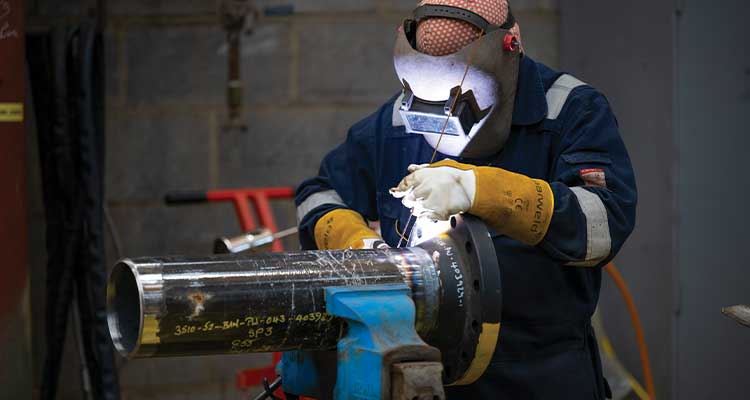Celebrating 40 years in business, Ledwood Mechanical Engineering reveals the secrets behind its success, as well as plans for a sustainable future
As a leader in delivering complex projects within the energy sector, Ledwood Mechanical Engineering (Ledwood) is celebrating 40 years in business this year. It designs, constructs, installs, and project manages the delivery of large, complex projects to the oil, petrochemical, renewables, nuclear and gas sectors.
“We are a privately owned company that has completed some fantastic projects over its 40 years and navigated the ups and downs of a changing world,” begins Mark Davies, of the Business Development Team at Ledwood. “We are proud to still be a local Welsh company, winning projects and establishing quality jobs within the area and further afield, which provides the UK industry with a highly skilled workforce.”
As a major provider of specialist services to the oil and gas, renewables, and power generation sectors, Ledwood has gained an admirable reputation for delivering projects on time, within budget, and with an unbeaten safety record. Last year, Ledwood was named on Insider’s Growth List, with 38 percent growth in 2021, equivalent to $7.6 million. So, how exactly has Ledwood built a positive reputation and experienced such incredible growth?
Since its inception, the company’s steady, organic growth has been attributed to the high-quality skills and knowledge of its professional team. “Not only do we have experienced project managers, but we have expert welders, mechanical fitters, and riggers, so we have people with incredible experience across the whole organization,” Mark states.

“We have a core of very experienced project managers, who provide unparalleled expertise in managing large projects, including gas power stations, oil refineries, and renewables,” he adds. “Another huge advantage is afforded by our fantastic facilities at the port of Pembroke, which also provide us with undisturbed access to the sea.
“We have a huge ten-acre facility with access to an additional, equally expansive site,” says Mark. Ledwood’s substantial engineering facilities in Pembroke, Wales include 60,000 square feet of fabrication space, with an additional 250,000 square feet available if required. It has a 12,000-square-foot center dedicated to painting and protective coatings, as well as five acres of assembly area. The site also has adjacent quayside facilities, with a 150-meter-long quay and a minimum of 11 meters water depth.
Its extensive resources enable Ledwood to operate worldwide, either through shipping fabrications overseas, or project management teams travelling across the globe to deliver complex engineering installations. For example, its components have been shipped worldwide for installation in harsh, offshore locations for projects such as energy exploration. Combined with its deep-water quayside location, which facilitates loading of modules directly onto seagoing vessels, Ledwood is in a prime position to solidify its global presence.
Cracking transformation
Currently, the business is simultaneously working on two major projects. Firstly, it is involved with a prestigious project on Hinkley Point C, a nuclear power station being built in Somerset, on which it has been working since 2016. “We have got a contract with General Electric Steam Power (GE) to install equipment in the main turbine walls, which is worth over £50 million,” Mark explains. “We will be on Hinkley Point for another four years. The project is hugely beneficial to us, providing a constant income and stability, which is crucial in such a volatile and turbulent phase in the industry.
“We are not just working with GE on Hinckley Point, but we are also working with Sabic to improve their site on Teesside,” he adds. Sabic has invested $1.37 billion in its Teesside facility, with the aim of achieving decarbonization. Ledwood is working with Sabic to strengthen its general operations, and deliver a chemical cracker transformation, which will make Sabic’s site one of the world’s lowest carbon-emitting crackers.
Industrial revolution
The topic of decarbonization subsequently turns the conversation towards sustainability and what this signifies for the industry. Mark elaborates: “The energy sector is in a complete transition phase. Over the next 20-to-30 years, we will witness a potential industrial revolution across the whole industry. This is because the industry is moving away from fossil fuels, into an energy industry hopefully driven by renewables.
“In our corner of the world, surrounded by the Celtic Sea, there will be massive investments and construction of offshore, floating wind farms, which we are ideally placed to deliver,” Mark predicts. “There’s a huge number of sustainability projects ongoing, ranging from new nuclear sites, and carbon capture and storage, to hydrogen production and renewable facilities.”

However, uncertainty over the future does not come without challenges and doubts. “We hear about lots of fantastic projects, but will the investment be there for these projects to go ahead?” he asks. “Will we be able to find sufficient people to physically deliver these projects?”
That said, Mark remains optimistic about the energy industry’s future. “It’s a really exciting time for young people to learn about and get involved in the industry,” he states. “We run a successful apprenticeship training scheme, but we need to promote careers in engineering and manufacturing much earlier. Hence, Ledwood plans to work with primary and secondary schools to explain the nature of the work we do and the potential benefits to them and to wider society.”
Specialist services
Turning to the future of the company, Mark goes on to say: “The transformation of the industry from fossil fuels to renewable sources means there is a lot of uncertainty, but the overriding theme is to go clean. Ledwood is focused on keeping a keen eye on new offshore wind and carbon capture developments not only in its Welsh heartland but also in the traditional industrial areas of the UK such as the North East and North West of England. We must ensure we possess the skills and understanding to be in a secure position to bid for these new developments as they arise.”
However, in the near future, Ledwood has specific goals. “We will continue to grow, remain working on Hinkley Point and hopefully win contracts on Sizewell C as they emerge,” Mark concludes. Wouldn’t it be fantastic for Ledwood to be a key partner in developing offshore wind farms in the future, just 30 miles from its base in Wales? Despite the uncertainty in the industry, Ledwood is poised to adapt, and consistently deliver projects in line with its reputation as a quality provider of specialist services.
